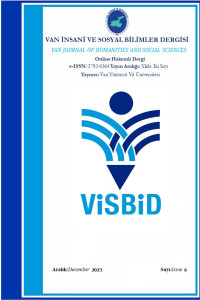Abstract
İnsan tutum ve davranışlarının temel güdüleyicisi olarak ekonominin, yaygın düşüncenin aksine, insanların büyük çoğunluğunun, inanç ve düşüncelerinin ana yönlendiricisi, kişilik ve kimliğinin niteliğinin de belirleyicisi olduğu söylenebilir. Ekonomi, insanın dünyayı kavrama biçimi, doğa ile ilişkisi, sınıfsal ve kültürel düzeyi gibi birçok kategorinin de ana belirleyicisi olarak ifade edilebilir. Farklı disiplinlerin gözlüğünden bakıldığında, sınırsız anlatma olanaklarına sahip roman türünün, insanı olabildiğince geniş perspektiflerden ele alırken onun ekonomik konumunu sürekli detaylandırmasına karşın, bu olgunun edebi araştırmalarda benzer şekilde değerlendirildiğini söylemek güç görünmektedir. Sosyolojik yönü de belirgin olan romanın bir de bn ıu açıdan değerlendirilmesi ayrı bir anlamlılık taşımaktadır. İnsanın iktisadî varlığı ya da yoksunluğu, gündelik yaşamdaki tutum ve davranışları gibi dünya ile her türden ilişkisinde etkin bir sınır belirleyicidir. Türk edebiyatının, çoklu bakış açılarına zengin nesnel karşılıklar verebilen yetkinlikteki tek Nobel ödülü yazarı Orhan Pamuk’un (1952-) romanları, bireyi tarihsel süreç içinde toplumsal olgular ile bir arada ele ele alır. Yazarın eserlerinde, Osmanlı devletinin özellikle son dönemlerinden günümüze kadar geçen süreçte çizilen panorama, onu sosyo-ekonomik ve kültürel doku içinde deneyimlediği süreçleri birçok boyutu ile görünür kılar. Bu makalede; yazarın eserleri, bireyin ve toplumun ekonomik varsıllığı ve/veya yoksunluğu ile uyumluluk arz eden tutum ve davranışlarına dönük bir iz sürülmektedir. İnsanın ekonomik statüsünün; duygu ve düşünce dünyası gibi, gündelik yaşam pratiklerinin de belirleyicisi olduğu öne sürülmekte, yaşamı yönlendiren gerilimlerin de gerisindeki temel güdünün bu olduğu varsayılmaktadır. Geleneksel üretimin egemen olduğu toplumdan, tüketimin var olma gerekçesine dönüştüğü modern topluma kadar sürdüğü, günümüzde ise çılgınlık düzeyine eriştiği gözlemi Pamuk’un romanları üzerinden gözlenmeye çalışılmaktadır.
Keywords
Edebiyat ve Ekonomi Roman ve Ekonomi Orhan Pamuk Gündelik Yaşam Tüketim Kültürü Sınıfsal Farklılık
Ethical Statement
Makalede etik açıdan beyan gerektirecek bir durum söz konusu değildir.
Supporting Institution
---
Thanks
---
References
- Akdere, Ç.– Özge, M. (2017). “İktisat ve Edebiyatın Disiplinlerarası iletişimi: Stephan King’in Ruhlar Dükkânı romanında Tüketim”. İktisat ve Diğer Bilimler. İstanbul: İletişim Yayınları. 185-225.
Abstract
It can be said that the economy, as the main motivator of human attitudes and behaviors, is, contrary to popular belief, the main driver of the beliefs and thoughts of the vast majority of people, and the determinant of the quality of their personality and identity. The economy can also be stated as the main determinant of many categories such as the way people comprehend the world, their relationship with nature, their class, and cultural level. From the perspective of different disciplines, it seems difficult to say that this phenomenon is evaluated in a similar way in literary studies, despite the fact that the novel genre, which has unlimited narrative possibilities, constantly elaborates on the economic position of man while dealing with him from as broad perspectives as possible. The evaluation of the novel genre, which also has a distinct sociological aspect, from this point of view is also meaningful. The economic existence or deprivation of human beings is an effective boundary determinant in all kinds of relations with the world, such as their attitudes and behaviors in daily life. The novels of Orhan Pamuk (1952-), the only Nobel Prize-winning author of Turkish literature capable of giving rich objective responses to multiple perspectives, deal with the individual together with social phenomena in the historical process. The panorama drawn in the author's works, especially from the last periods of the Ottoman state to the present day, makes visible the processes experienced by the individual within the socio-economic and cultural texture in many dimensions. This article traces the author's works, attitudes, and behaviors that are in harmony with the economic wealth and/or deprivation of the individual and society. It is argued that the economic status of the human being is the determinant of daily life practices as well as the world of emotions and thoughts, and it is assumed that this is the basic motive behind the tensions that direct life. The observation that it has continued from the society dominated by traditional production to the modern society where consumption has become a reason for existence and that it has reached the level of madness today is tried to be observed through Pamuk's novels.
Keywords
Literature and Economy Novel and Economy Orhan Pamuk Everyday Life Consumption Culture Class Difference.
References
- Akdere, Ç.– Özge, M. (2017). “İktisat ve Edebiyatın Disiplinlerarası iletişimi: Stephan King’in Ruhlar Dükkânı romanında Tüketim”. İktisat ve Diğer Bilimler. İstanbul: İletişim Yayınları. 185-225.
Details
| Primary Language | Turkish |
|---|---|
| Subjects | Modern Turkish Literature in Turkiye Field |
| Journal Section | Research Articles |
| Authors | |
| Early Pub Date | December 26, 2023 |
| Publication Date | December 30, 2023 |
| Submission Date | November 19, 2023 |
| Acceptance Date | December 23, 2023 |
| Published in Issue | Year 2023 Issue: 6 |
ViSBiD, MLA ve Crossref tarafından indekslenmektedir. Ayrıca Index Copernicus takip sistemine alınmıştır.


